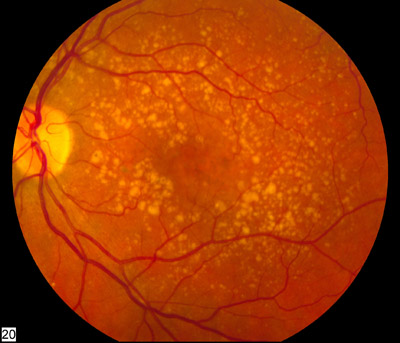Introduction to Age-Related Macular Degeneration
AMD affects central vision, making it harder to see things clearly. The macula is a small part of the retina responsible for sharp vision, necessary for reading and driving. If you have AMD, the macula doesn’t work as it should. Understanding the macula’s basic function helps us appreciate why losing this central vision is so significant for daily tasks.
Recognizing the Symptoms and Early Signs of AMD
The symptoms of age related macular degeneration can appear gradually. Often, the first sign is blurred vision or difficulty recognizing familiar faces. Straight lines might appear wavy or distorted. Adapting to low light becomes challenging, making daily activities more troublesome. During an eye examination, an early sign called drusen might be visible. These are tiny yellow deposits under the retina. Spotting them early can indicate the onset of AMD. Always pay attention to these symptoms and schedule regular eye exams, even if your vision seems perfect.
Exploring the Types of AMD
AMD comes in two types: Dry and Wet. – Dry AMD is more common and progresses slowly. Its symptoms include mild vision loss as the macula gets thinner with age. – Wet AMD is less common but more severe. Here, abnormal blood vessels grow under the retina, causing rapid vision loss. Recognizing the differences between the two is vital, as Wet AMD can lead to quicker and more significant vision changes.
Causes of Age-Related Macular Degeneration
Several factors contribute to AMD. Genetics play a significant role, so if your family has a history of AMD, your risk might be higher. Age is a factor too; most cases occur in people over 50. However, lifestyle choices also matter. Smoking increases risk, so quitting is beneficial. A poor diet lacking essential nutrients can affect your eye health. Eating a balanced, nutritious diet can support better eye health. Consider environmental factors, like pollution, and make lifestyle changes to protect your eyes.
Understanding AMD’s Progression and Stages
Age related macular degeneration progresses through early, intermediate, and advanced stages. In the early stage, vision might seem fine despite changes in the retina. Intermediate AMD might bring some vision blurriness. In the advanced stage, central vision loss can severely impact tasks like reading and recognizing faces. Regular eye exams at each stage are crucial to monitor progression and adjust treatments. This approach can help maintain a good quality of life despite AMD.
Comprehensive Approaches to AMD Diagnosis
Diagnosing AMD involves a detailed eye exam. Doctors use imaging tests to look at your retina and detect changes early. These tests are vital as they identify AMD before significant vision loss occurs. Monitoring early signs ensures that interventions can be effective, ultimately preserving vision longer.
Adapting Lifestyle and Daily Living Adjustments for AMD Patients
Managing daily life with age related macular degeneration can be challenging, but practical tools can help. Use strong lighting and magnifying glasses for reading. Incorporating audiobooks and voice-activated devices can aid daily tasks. Beyond physical adjustments, the emotional journey with AMD is significant. Connecting with community support groups can help mentally and emotionally. In India, many resources offer assistance and information to help patients live comfortably.
Preventive Measures and Current Treatment Options
Adopt a healthy lifestyle to lower the risk of AMD. Focus on a diet rich in leafy greens, fish, and nuts. Exercise regularly. The AREDS2 formula, a vitamin supplement, shows good results in some cases. It’s advisable to have conversations with doctors about treatment options, such as anti-VEGF therapy, which can slow down vision loss in wet AMD. Regular check-ups with eye-care professionals can help manage disease progression and explore new treatments.
Call to Action: When to Consult an Eye Specialist
Regular screenings are important for everyone over 60 or with other risk factors for AMD. If you notice significant changes in your vision, seek medical advice quickly. Early detection is crucial to managing and slowing down the effects of AMD.
Conclusion: Empowering Readers for Better Eye Health
To protect your vision, awareness and early action are key. Understanding age related macular degeneration can guide you in making informed decisions about prevention and treatment. Adopt healthy habits, and stay vigilant with your eye health to maintain your quality of life. Your vision matters—take steps today to safeguard it for the future!

